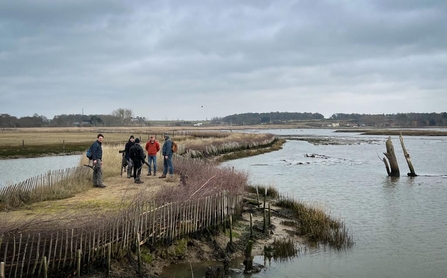Suffolk Wildlife Trust’s Hazlewood Marshes featured in the ‘Vanishing Villages’ episode of BBC One’s Countryfile programme on Sunday 5th March. Presenter Matt Baker met Andrew Excell, our South East Suffolk Sites Manager and Warden Rachel Norman to see the amazing array of wildlife thriving on the intertidal marshes.
BBC Countryfile features Hazlewood Marshes
Matt Baker, Rachel and Andrew at Hazlewood Marshes, Sarah Groves

BBC Countryfile Filming at Hazelwood Marshes, Sarah Groves
In December 2013, a powerful storm surge swept down the east coast, breaching many sea and river walls and flooding homes and businesses. The surge affected six of our nature reserves, but none more dramatically than Hazlewood marshes – formerly a freshwater mosaic of grazing habitat, hedgerows and reeds protected from the River Alde by the river wall.
On the night of the 5th December, the river wall breached in three places – the power of the surge rushed over the wall ripping out the defences and allowing salt water to flood into the low-lying marshes. The freshwater marshes were wiped out overnight. However, after the initial shock, the conservation team at Suffolk Wildlife Trust soon recognised that nature had given us an opportunity to manage the reserve sustainably for the long-term and allow the marshes to return to their former natural state – an intertidal habitat with saltmarshes and muddy estuarine creeks.
In this episode of BBC Countryfile, Matt chatted with Andrew and Rachel about how wildlife is exploiting the rich food resources now available at the marshes and hammered in some silt accretion posts to allow the team to monitor the build-up of sediment in the marshes as the mudflats slowly evolve into saltmarsh.
The marshes are nursery grounds for a wide variety of fish species, including grey mullet – a favourite fish for visiting ospreys as they stop to feed while on migration. The mudflats and saltmarshes are also carbon stores – 50 times more effective at carbon capture than grassland. Many species of bird feed here on the rich invertebrate life and the small islands in the marsh are safe roosting spots for species such as lapwing, redshank and spoonbill.
The breach has also enabled a natural ‘ecotone’ gradient to return – a gentle transition from woodland, grassland and freshwater to a brackish zone, then to saltwater - rather than a defensive wall dividing the saltwater environment from freshwater. Wildlife thrives in these transition zones.
Hazlewood Marshes nature reserve page




